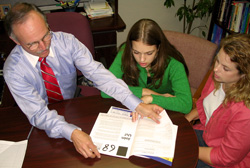School Counselors: Facilitating Transitions for Students with Disabilities from High School to Post-School Settings
Assessment
Take some time now to answer the following questions. Please note that the IRIS Center does not collect your Assessment responses. If this is a course assignment, you should turn them in to your professor using whatever method he or she requires. If you have trouble answering any of the questions, go back and review the Perspectives & Resources pages in this module.
 Explain why transition planning services are important for students with disabilities.
Explain why transition planning services are important for students with disabilities.- List and discuss at least four ways school counselors can assist students with disabilities in the transition process.
- Ann Haller is a ninth grader who has a profound hearing loss. A gifted artist with a 3.5 GPA, she knows she wants a career in drawing but is not certain of her post-school options. What three areas might you need to assess to help Ann with her transition planning?
- List three sources of information you can refer to Ann so she can learn more about potential employment opportunities.
- The school counselor is instrumental in assuring that ongoing communication occurs in order to better prepare the student for achieving his or her post-secondary goals.
- Explain how the counselor serves as a liaison between the school community, including the student, and the community-at-large.
- Discuss the importance of the liaison’s role in building relationships in the transition process.